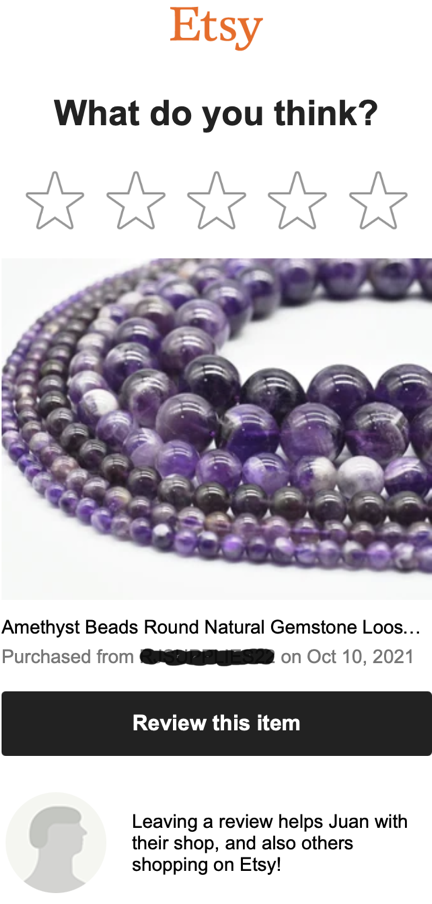Why they’re important.
This morning, I got an email message from Etsy asking me to review some beads I’d bought from an Etsy shop.
I am ruthlessly honest when I review a product. I want the seller/maker to know what I think so they can feel good (from a positive review) or fix problems (from a negative review).
I also want other potential buyers to know if a product fell short of expectations or didn’t match descriptions or images. I want to inform other buyers so they either buy a great product or avoid a crappy one or even just know where a product might disappoint them.
One of the things that really gets under my skin is sellers/makers who ask for positive reviews only. WTF? What good is a review if it isn’t honest?

These amethyst beads, in the smallest size shown here, is what I thought I was buying. Nice purple color, no? Etsy asked for a review and explained why.
The beads in question this time around were disappointing. They were amethyst beads (or supposed to be) and the image on the Etsy listing showed bright purple beads in a variety of sizes. I wanted the 4mm size, which I use to make matching necklaces for some of my pendants. A nice purple amethyst and silver bead necklace could even sell on its own — I’ve sold them before — without a matching pendant.
That’s what was going through my head when I clicked the buy button.
What arrived a week later were dull, barely purple beads that bore no resemblance to the photo other than the fact that they were round. They were strung on purple string and, because they were a bit translucent, that color came through a bit — but not as much as the photo! — while they were still strung. Once removed from the string, their true color was revealed and I honestly can’t say they’re purple. More like a dull, purplish gray-black.
Frankly, I’m not even sure they’re amethyst.
I’ll be honest: the beads were cheap and yes, you do get what you pay for. Although it bothered me that the beads didn’t match the photo, it wasn’t worth returning them. I could probably find something to do with them. And even if I didn’t, it wasn’t a huge loss. I considered it a lesson learned. I would not use that shop again.
And then the request for a review came from Etsy. I clicked the link and wrote the review.
I suspect the shop owner will get all pissed off about this. After all, too many shops on Etsy have 5-star review status. Like all of their customers are always happy. How can that be? Is it because these shops ask for positive reviews only?
And please don’t get me started on the number of times I bought an Amazon product or book based on glowing reviews only to have that product fail or that book be total crap?
Why aren’t legitimate reviewers being honest? It only hurts them — and their fellow shoppers — in the end.
Discover more from An Eclectic Mind
Subscribe to get the latest posts sent to your email.

I completely agree. The obsession with high scores and glowing reviews simply devalues feedback from those who take the role seriously.
I once gave a poor review for a product bought via Amazon which had not arrived within four days of the due date. The seller actually phoned me up.
How on earth did they get my number?
They should not be giving your phone number to anyone.
I gave a bad review to a product — another cheap thing I considered a “lesson learned” — and the maker of the product sent me another one for free. Were they hoping I would change my review? The second one was as bad as the first. They both ended up in the trash. I did not change my review.
What’s really burning me up right now is that I spent more than $100 for a pair of 150-foot hoses that had gotten glowing reviews on Amazon. One lasted 3 months, the other lasted 5 months. They supposedly had a 1-year warranty but I could not get the maker to replace or refund me for either one.
Review inflation is rampant on AirBnB.
I think it’s rampant everywhere. Or are people’s standards so low that “average” or “acceptable” is now worth 5 stars?
I assume all positive reviews are shills so I only read negative reviews. If the negative reviews only mention petty issues (“shipping was slow”, “wish it were cheaper”), I’m comfortable with the purchase. But if the negative reviews mention substantive issues, it’s a real warning.
That’s a good rule of thumb.